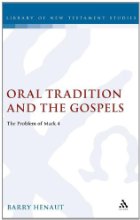 This post continues on directly from Taking Oral Tradition For Granted: Bultmann (1).
This post continues on directly from Taking Oral Tradition For Granted: Bultmann (1).
Barry W. Henaut is arguing that scholars have taken for granted the assumption that the Gospels drew upon oral traditions about Jesus, or sources like Q that drew upon oral traditions, for their narratives. This is not to say that Henaut argued against the historical Jesus. Not at all. I assume Henaut does not doubt the historicity of Jesus or that there were oral traditions circulating about him after his death. What he is arguing is something quite independent of (though not irrelevant to) the question of Jesus’ historicity.
He is arguing that the evidence that the Gospel narratives were derived creatively from other literary sources is stronger than the evidence that they were based on oral traditions that could be traced back to Jesus.
This post continues Henaut’s discussion of Bultmann’s view of oral tradition.
Double Attestation and Orality (continued)
Here is how Bultmann reconstructs the “Confession of Faith in Jesus” passage. Keep in mind that the saying in Mark is believed to be derived from a source that is quite independent of the one in Luke which is said to be derived from Q. What scholars/Bultmann have believed we are reading here is a double independent witness (Mark and Q) to the existence of an oral tradition about a saying of Jesus.
Because Jesus speaks of “the Son of Man” in the third person it appears that he does not consider himself to be that Son of Man. But we know early Christians did believe he was the Son of Man. Therefore, it is argued, this saying derives from Jesus.
| Mark 8:38
|
Q 12:8-9 |
| If anyone is ashamed of me and my words in this adulterous and sinful generation, the Son of Man will be ashamed of them when he comes in his Father’s glory with the holy angels.” | And I tell you, everyone who acknowledges me before others, the Son of Man also will acknowledge before the angels of God; but whoever denies me before others will be denied before the angels of God.
|
Later the Gospel of Matthew will change the saying so that Jesus says, “Whosoever therefore shall confess me before men, him will I confess” so that the words of Jesus are brought into line with Christian belief that Jesus was that Son of Man.
Henaut is uncomfortable with this argument:
Bultmann has again overstated his case in assigning this logion to Jesus. The phrases [I] and [the Son of Man] need not imply a distinction of person — they are more likely in synonymous parallelism with a change of wording. (p. 36)
We see similar arguments from a number of other scholars who interpret the “Son of Man” in this context not as a Christological title derived from the Book of Daniel, but an originally Aramaic idiomatic circumlocution for “a human/person/man”. The similarity lies in seeing understanding “I” and “son of man” as being an instance of synonymous parallelism. (I think this is adding further complexity to the argument by introducing layers of other constructs, including imagined historical scenarios and lines of communication through many decades before it was put in writing, to make the saying work. Far simpler, in my mind, to imagine the author drawing upon the literary antecedent of Daniel.)
We can even witness a contemporary illustration of how such parallelism works by looking at the sayings of a follower of Jesus that were left on this blog. Like Jesus, dbg speaks modestly of himself, David Gowler, in the third person. 🙂 Continue reading “Taking Oral Tradition For Granted: Bultmann (2)”

